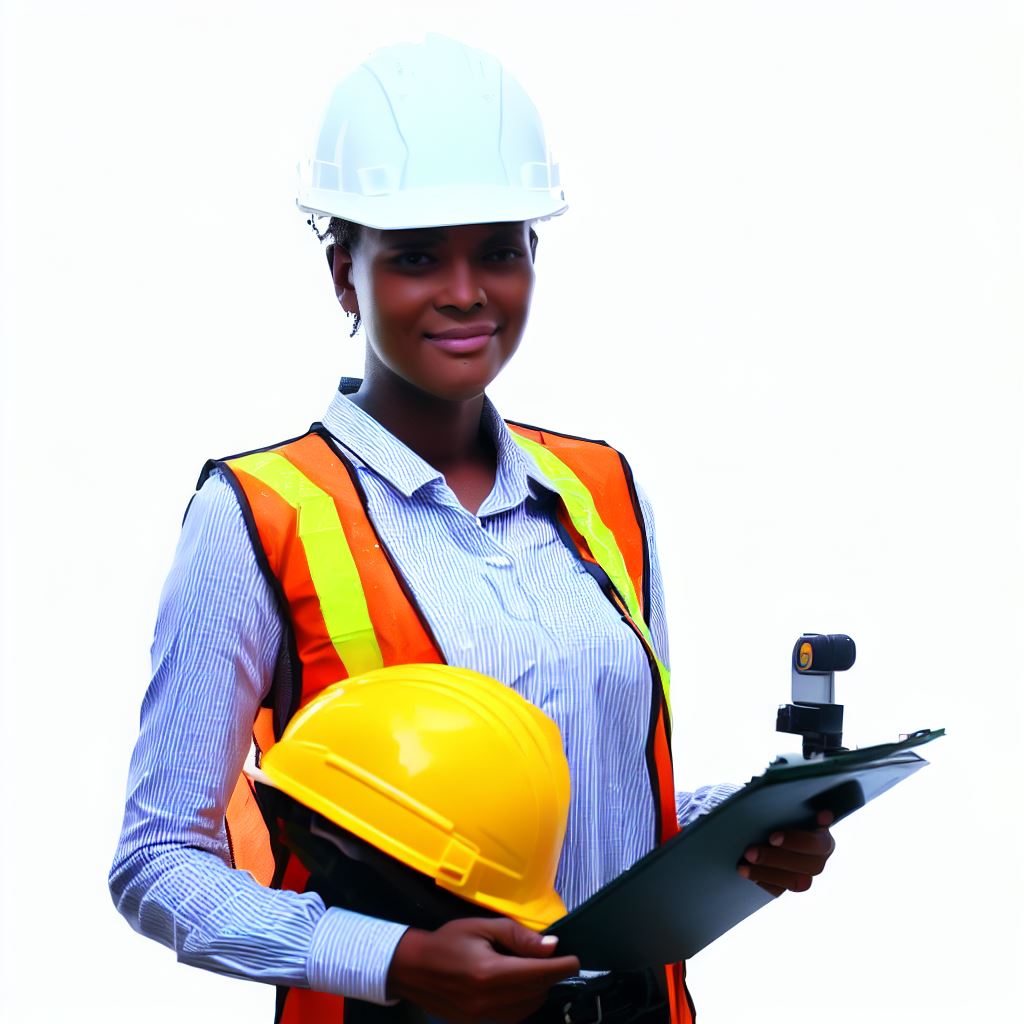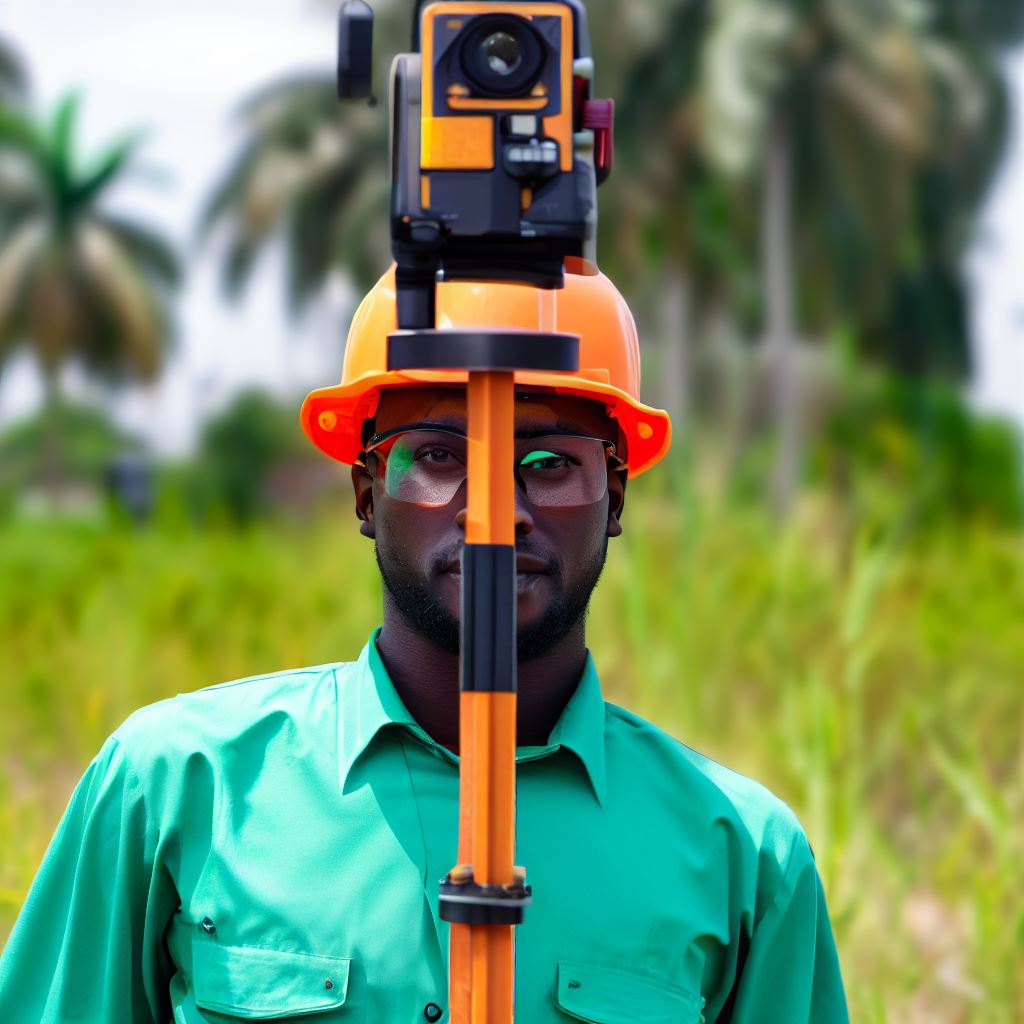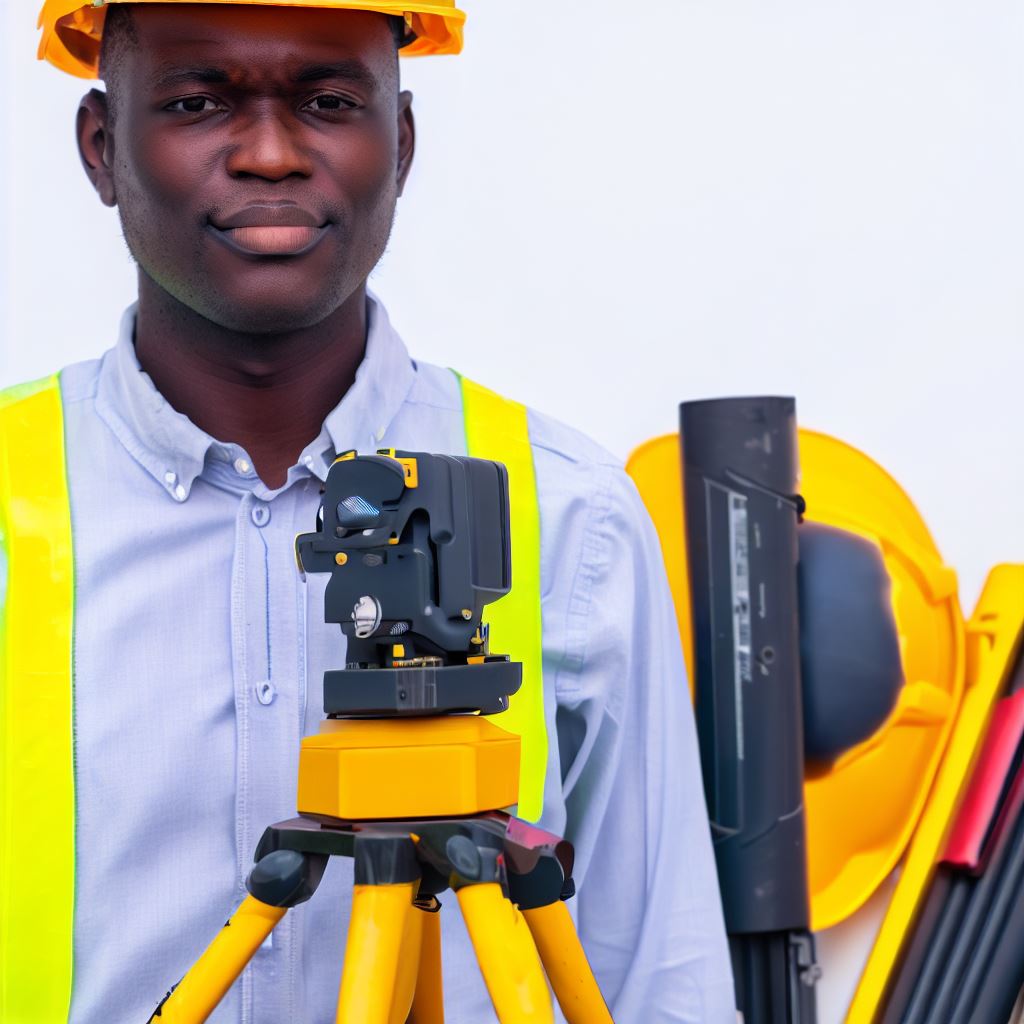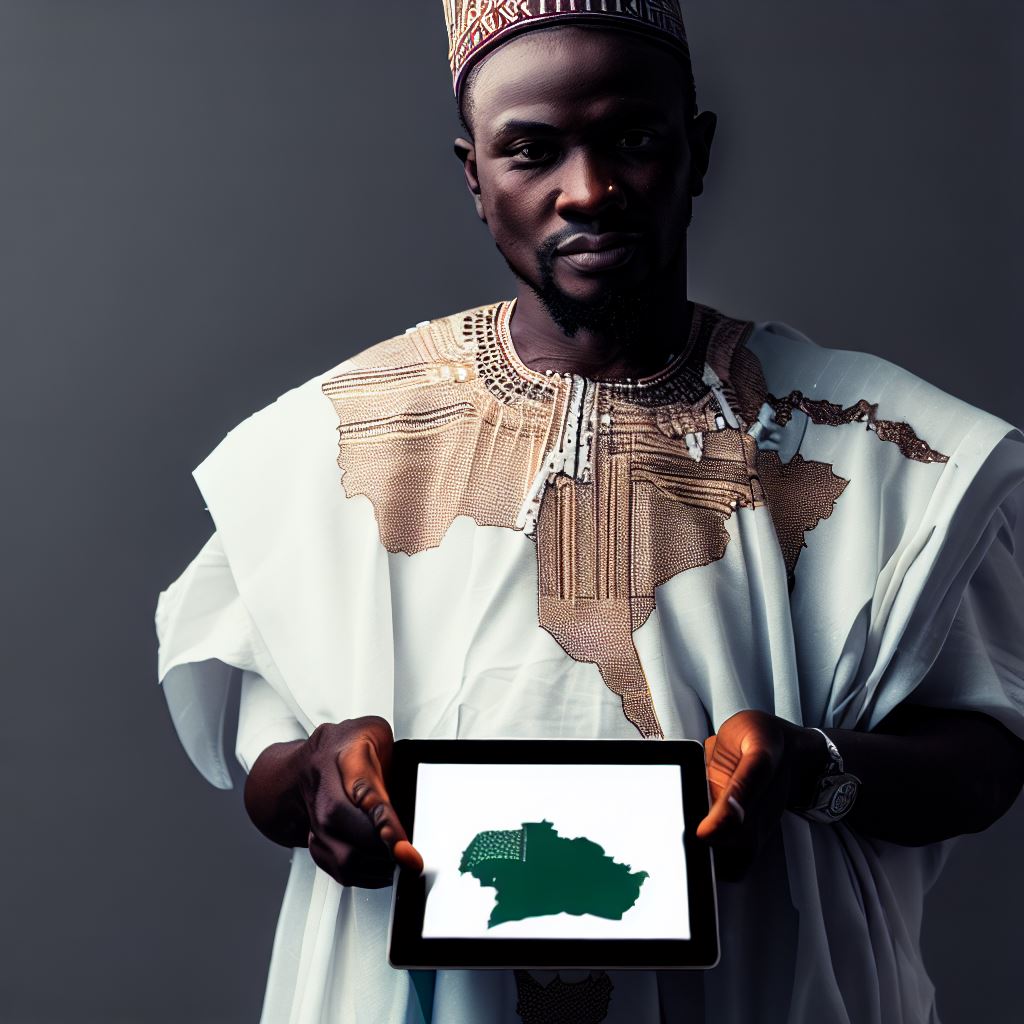Introduction
A. Women in Surveying
The presence of women in surveying is growing, challenging gender norms in traditionally male-dominated fields.
B. Focus on Nigeria
This section centers on the unique landscape of surveying in Nigeria, where women are breaking barriers.
C. Thesis Statement
Exploring the role of women in surveying in Nigeria is crucial, as it highlights their contributions, inspires others, and promotes gender equality in STEM careers.
Historical Perspective on Surveying in Nigeria
A. Early Development of Surveying in Nigeria
Surveying in Nigeria dates back to the pre-colonial era, serving diverse purposes such as land measurement and boundary demarcation.
Indigenous tribes had their own surveying methods, which involved using simple tools like ropes and bamboo sticks.
The arrival of British colonial rule in the late 19th century brought formal surveying practices to Nigeria.
The first survey department was established in Lagos in 1861, marking the beginning of modern surveying in Nigeria.
B. Male-Dominated Nature of the Profession in Its Early Years
During the early years of surveying in Nigeria, the profession was predominantly dominated by men.
The colonial administration reserved surveying positions for British expatriates, limiting opportunities for indigenous Nigerians.
This exclusionary practice created a gender gap in the profession, barring women from pursuing careers in surveying.
C. Notable Achievements by Women in Surveying during this Period
Despite the male-dominated nature of the profession, a few women made significant strides in surveying during this period.
One notable pioneer was Chief Mrs. Funmilayo Ransome-Kuti, who became the first Nigerian woman to practice surveying.
Ransome-Kuti defied societal norms and studied surveying in the United Kingdom, earning her license in the early 1930s.
She went on to establish her own surveying firm and played a vital role in shaping land administration policies in Nigeria.
Another remarkable woman in Nigerian surveying history is Dr. (Mrs.) Maryam Mairo Aminu-Waziri.
Aminu-Waziri became the first female Surveyor-General of Nigeria in 2017, breaking the glass ceiling in the profession.
Her appointment highlighted the increasing recognition and opportunities for women in surveying in modern Nigeria.
Despite their achievements, women in surveying during this period faced numerous challenges.
They encountered societal biases, discrimination, and limited access to education and career advancement opportunities.
However, the determination and resilience of these women paved the way for future generations of female surveyors.
In essence, the early development of surveying in Nigeria was marked by the dominance of men in the profession.
Women faced significant barriers and biases, yet some made notable achievements. Chief Mrs. Funmilayo Ransome-Kuti and Dr. (Mrs.) Maryam Mairo Aminu-Waziri were trailblazers who defied stereotypes and played vital roles in shaping the profession.
Their contributions symbolize the increasing recognition of women in surveying in Nigeria today.
Read: Challenges and Opportunities for Surveyors in Nigeria
Current State of Surveying in Nigeria
A. Overview of the profession and key responsibilities
The profession of surveying plays a pivotal role in various sectors, including construction, infrastructure development, urban planning, and land management.
Surveyors are responsible for accurately measuring and mapping the physical features of the land, such as boundaries, elevations, and contours.
By collecting precise data, surveyors provide crucial information for making informed decisions in these sectors.
B. Gender imbalance in the field, specifically the underrepresentation of women
Despite the importance of surveying, there is a significant gender imbalance within the profession, particularly in Nigeria.
Historically, surveying has been perceived as a male-dominated field, causing limited opportunities and underrepresentation for women.
This gender imbalance is a concern that needs to be addressed for a more diverse and inclusive industry.
Efforts are being made to address this underrepresentation and bridge the gender gap in surveying.
Various organizations and professional bodies are implementing programs and initiatives to encourage more women to pursue careers in the field.
These initiatives include scholarships, mentorship programs, and awareness campaigns to showcase successful women surveyors as role models.
By increasing the representation of women in surveying, Nigeria can tap into a broader talent pool, enhancing innovation, creativity, and problem-solving within the industry.
It can also contribute to a more inclusive and diverse work environment, fostering equal opportunities for all professionals.
C. Statistics or data on the number of women in surveying in Nigeria
According to recent data, the number of women in surveying remains relatively low in Nigeria. Out of the total registered surveyors in the country, only a small percentage are women.
This underrepresentation of women in the profession is not reflective of their capabilities or interest in the field.
There are various factors contributing to the low participation of women in surveying.
One significant factor is the lack of awareness and encouragement for girls to pursue careers in science, technology, engineering, and mathematics (STEM) fields, including surveying.
The prevailing societal norms and stereotypes often discourage girls from considering these professions, resulting in limited female representation.
Additionally, the demanding nature of the surveying profession, involving extensive fieldwork and sometimes challenging conditions, may deter some women from entering the field.
The lack of adequate support systems to address the unique needs and concerns of women in the industry further exacerbates the gender imbalance.
It is essential for all stakeholders, including educational institutions, government agencies, and industry associations, to collaborate and actively promote gender equality in surveying.
This can be accomplished through targeted recruitment strategies, providing female-friendly working conditions, and fostering a supportive and inclusive culture.
In fact, the current state of surveying in Nigeria highlights an existing gender imbalance, with women being underrepresented in the profession.
However, efforts are underway to rectify this imbalance and provide equal opportunities for women in surveying.
By promoting awareness, encouragement, and support, Nigeria can create a more diverse and inclusive industry where women can thrive and contribute to its development.
Read: Top Surveying Firms in Nigeria: Where to Begin a Career
Challenges Faced by Women in Surveying in Nigeria
A. Societal Stereotypes and Biases Affecting Women’s Participation
- Traditional beliefs in Nigeria consider surveying as a male-dominated profession.
- Stereotypes portray women as not capable of handling physical and technical aspects of surveying.
- Society often expects women to prioritize family responsibilities over their careers.
- Gender bias assumes that women lack the necessary leadership and decision-making skills.
- Women face criticism and stigma for challenging societal expectations and pursuing careers in surveying.
B. Obstacles Related to Education and Professional Training
- Limited access to quality education for girls in certain regions of Nigeria.
- Lack of awareness and information about surveying as a career option for young girls.
- Inadequate resources and facilities in educational institutions for female students pursuing surveying.
- Insensitive educational policies that discourage girls from pursuing science and technical fields.
- Limited opportunities for women to receive professional training and development in surveying.
C. Workplace Challenges and Gender Discrimination Experienced by Female Surveyors
- Gender discrimination in job opportunities where surveying firms prefer hiring male candidates.
- Persistent gender pay gap with women in surveying earning less than their male counterparts.
- Lack of mentorship and support networks for female surveyors to advance in their careers.
- Inequality in promotions and career progression, limiting women’s access to senior positions.
D. Addressing the challenges
As women in surveying continue to face numerous challenges in Nigeria, it is crucial to address these issues and promote gender equality within the profession.
Efforts should be made to break societal stereotypes and biases by showcasing successful female surveyors as role models and highlighting their achievements.
Education and training opportunities should be accessible to all, regardless of gender, and public awareness campaigns can be conducted to encourage young girls to consider surveying as a viable career option.
Additionally, workplace policies and practices must be revised to ensure equal opportunities and fair treatment for female surveyors.
Companies should actively promote diversity and inclusion, providing mentorship programs, and support networks to help women thrive in their careers.
Addressing the gender pay gap and ensuring equal pay for equal work is also essential.
Furthermore, collaboration between professional bodies, government agencies, and educational institutions can play a vital role in creating a more supportive environment for women in surveying.
By incorporating gender equality initiatives and encouraging women’s participation in decision-making processes, the profession can become more inclusive and diverse.
In short, women in surveying in Nigeria face various challenges due to societal stereotypes and biases, limited access to education and training, and workplace discrimination.
It is crucial to address these obstacles and promote gender equality to create a more inclusive and diverse profession.
By breaking down barriers and providing equal opportunities, women can contribute their valuable skills and perspectives to the field of surveying, ultimately benefiting both individuals and society as a whole.
Read: Surveying in Nigeria: Education and Licensing Process

Success Stories and Role Models in Nigerian Surveying
A. Successful women who have made significant contributions to the field
- Dr. Patricia Ezemonye: Pioneering surveyor who developed innovative mapping techniques.
- Engr. Maryam Mohammed: First female surveyor to head a major surveying firm in Nigeria.
- Dr. Ngozi Emeka-Nwaogu: Renowned for her work in using surveying to mitigate environmental risks.
B. Their achievements and the impact they have had on promoting gender equality in surveying
These successful women have shattered barriers and proved that gender does not limit excellence in surveying.
Their achievements have inspired more women to enter the profession and have paved the way for greater gender equality.
By excelling in their respective fields, they have debunked stereotypes and encouraged other women to pursue careers in surveying, helping to create a more inclusive and diverse industry.
Dr. Ezemonye’s innovative mapping techniques have revolutionized the field, enabling more accurate and efficient surveying processes.
Her contributions have garnered international recognition and have inspired both men and women in the industry to embrace new technologies.
Dr. Ezemonye’s success has shown aspiring female surveyors that they have the power to make significant contributions to the field and that their expertise is valued.
Engr. Mohammed’s appointment as the head of a major surveying firm sends a powerful message about gender equality and the value of diversity in leadership positions.
Her success has broken gender stereotypes and provided a role model for aspiring female surveyors who may have faced barriers or discrimination in pursuing their careers.
Engr. Mohammed’s achievements have demonstrated that women can excel in leadership roles and contribute to the growth and development of the surveying profession.
Dr. Emeka-Nwaogu’s work in mitigating environmental risks through surveying has had a profound impact on both the industry and society.
Her expertise has helped identify and address potential environmental hazards, contributing to sustainable development.
By excelling in a field that is traditionally dominated by men, Dr. Emeka-Nwaogu has inspired other women to pursue careers in surveying and has shown the importance of diverse perspectives in tackling complex challenges.
C. Stories of female trailblazers and role models who can inspire aspiring female surveyors
In addition to the mentioned successful women, there are numerous other inspirational figures in Nigerian surveying who have made significant contributions to the field.
These trailblazers include:
- Engr. Jane Okonkwo: First female surveyor to serve as the President of the Nigerian Institution of Surveyors.
- Dr. Adaobi Duru: Respected academic and researcher, known for her groundbreaking work in geospatial analysis.
- Engr. Chioma Nwosu: Leading advocate for the rights and inclusion of women in surveying and engineering.
Their stories showcase the diverse talents and achievements of women in surveying, providing a wealth of role models for aspiring female surveyors.
These trailblazers have not only excelled in their careers but have also worked towards creating a more inclusive and supportive environment for women in the field.
They have actively mentored and inspired younger generations, ensuring a steady pipeline of future female surveyors who will continue to break barriers and make their mark on the industry.
Read: A Day in the Life of a Nigerian Surveyor: An Insight
Initiatives and Policies Promoting Women in Surveying
A. Government or organizational initiatives aiming to empower women in surveying
- The Nigerian government has implemented policies to increase the participation of women in the surveying profession.
- The Federal Ministry of Works and Housing has launched initiatives to attract and retain women in surveying.
- These initiatives include scholarships and grants specifically targeted towards women pursuing surveying education.
- Professional organizations such as the Nigerian Institution of Surveyors (NIS) have established mentorship programs for women.
- The NIS provides resources and support networks to encourage women to succeed and progress in the surveying profession.
- Other organizations, like the Association of Professional Women Surveyors of Nigeria (APWOSN), advocate for gender equality in surveying.
B. Policies or programs designed to promote gender diversity in the profession
- The Nigerian Institute of Estate Surveyors and Valuers has implemented policies to ensure gender diversity in the profession.
- They have established quotas for the inclusion of women in decision-making positions within the organization.
- The NIS has also developed policies to address gender biases and stereotypes that hinder women’s progression in surveying.
- These policies aim to create an inclusive and supportive environment that promotes the growth and development of women.
- The implementation of diversity training programs has also been instrumental in promoting gender equality in the workplace.
C. The importance of mentorship and support networks for women in this field
- Mentorship programs play a crucial role in empowering and supporting women in the surveying profession.
- Experienced professionals can provide guidance, advice, and career opportunities to women entering the field.
- These programs foster a sense of belonging and help women navigate the challenges they may face in a male-dominated industry.
- Women-specific support networks provide a safe space for sharing experiences, promoting collaboration, and advocating for change.
- Networking opportunities allow women to establish connections, find mentors, and gain access to resources for professional growth.
- By fostering mentorship and support networks, women in surveying can develop their skills, build confidence, and advance their careers.
In review, various initiatives and policies in Nigeria are dedicated to empowering women in surveying.
These efforts aim to increase gender diversity, create inclusive environments, and provide support networks and mentorship opportunities.
By promoting and supporting women in the profession, Nigeria can harness the full potential of its female surveyors and contribute to the overall growth and development of the field.
Read: How to Become a Licensed Real Estate Agent in Nigeria
Steps Towards Gender Equality in Surveying
A. Potential solutions and strategies to address the gender imbalance
- Establish mentorship programs to support and guide women in surveying careers.
- Implement affirmative action policies that promote equal opportunities for women in the profession.
- Encourage collaboration between professional organizations and educational institutions to create awareness about surveying as a viable career option for women.
- Conduct research and studies to identify the barriers and challenges faced by women in the field, and develop targeted interventions to overcome them.
- Establish networking platforms where women in surveying can connect and share experiences and knowledge.
- Advocate for equal pay and benefits for women in the profession, ensuring they receive fair compensation for their work.
B. The importance of promoting gender equality and diversity in the profession
Promoting gender equality and diversity in surveying is crucial for several reasons:
- Enhancing innovation and problem-solving: By including diverse perspectives, experiences, and ideas, the profession can benefit from a broader range of insights, leading to innovative solutions.
- Meeting workforce demand: The surveying profession is currently facing a shortage of skilled workers. Encouraging more women to enter the field can help address this gap and ensure a sustainable future.
- Overcoming biases and discrimination: By promoting gender equality, we can challenge and dismantle the stereotypes and biases that have traditionally excluded women from the profession.
- Building a more inclusive and representative industry: A diverse workforce brings different viewpoints, promoting fairness, and reducing the risk of discrimination within the profession.
- Enhancing the profession’s public image: By showcasing a diverse workforce, the surveying profession can attract more talent and appeal to a wider range of clients and stakeholders.
C. Ways to encourage more women to pursue careers in surveying
- Early exposure and education: Introduce surveying to girls at a young age through school initiatives and career fairs to raise awareness and generate interest.
- Highlight successful women in surveying: Showcase female role models who have excelled in the field to inspire and motivate young women to pursue surveying careers.
- Support educational scholarships: Financial aid specifically for women studying surveying to reduce barriers to entry.
- Collaborate with educational institutions: Develop inclusive and gender-sensitive curricula that foster an environment conducive to women’s learning and growth.
- Provide mentoring and networking: Opportunities for women in the profession to connect, share experiences, and receive guidance from established professionals.
- Foster a supportive work environment: Promote work-life balance, flexibility, and equal opportunities for career advancement.
By implementing these solutions and strategies, we can work towards bridging the gender gap in surveying, promoting inclusivity, and unlocking the full potential of the profession.
Gender equality is not just a matter of fairness; it is essential for a thriving and sustainable industry.
Conclusion
A. Summarizing the Key Points
In this blog post, we’ve explored the remarkable journey of women in surveying in Nigeria.
We’ve highlighted their achievements, challenges, and contributions, showcasing their resilience and determination.
B. Reinforcing the Significance
The significance of women’s participation in surveying cannot be overstated. Their diverse perspectives enhance the profession, drive innovation, and promote gender equality in a historically male-dominated field.
C. Call to Action
Let’s pledge to create a more inclusive and equal profession. Encourage young girls to explore surveying, support mentorship programs, and advocate for policies that foster diversity.
Together, we can reshape the future of surveying in Nigeria, ensuring it reflects the talents and potential of all its professionals.




